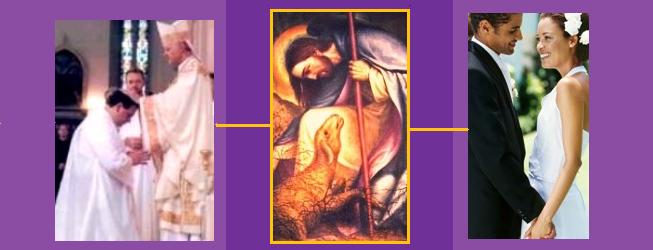My thoughts turn to the importance and need of fidelity precisely at this time when the Church is being tested, both from within and from without.
Fidelity to one’s word, to one’s promises, and to one’s vows to God is not something that can be taken for granted. This should be obvious, for we live in a time of massive infidelity. Contracts are broken, infidelity in marriage is not only practiced but even lauded in magazines such as Cosmopolitan and Playboy (not to mention worse publications), divorce is edging up to almost one for every two marriages. Many religious men and women have abandoned their solemn lifetime commitment to God in order to embrace some kind of social or political work.
Fidelity is a virtue closely allied to truthfulness. Its function is to incline a person to the fulfillment of his promises. Truthfulness inclines one to conform his speech to the judgment of his mind, while fidelity disposes him to conform his deeds to his promises and vows.
Even in the natural order, fidelity is a virtue, since it is truth in action. We are by nature social beings. This means in practice that we are dependent one upon the other. Since we are dependent, we need to trust each other in order to be able to build necessary social units, such as the family, local community, state, church, etc. If individuals are not truthful, not trustworthy, not faithful to what they say and promise, then the whole social system begins to crack. Because of the lack of fidelity in our society, many of our most important institutions are breaking down rapidly. And the breakdown is affecting not only civil society, but also the Church herself. When Catholics are unfaithful in marriage, unfaithful in business, unfaithful in the religious life, unfaithful in the priesthood, then the whole Church suffers. Today, infidelity, rather than being the rare exception that one hears about in some distant place, is our permanent neighbor and, all too often, a visitor in our own home.
In the Old Testament, one of the essential attributes of Yahweh is his faithfulness (cf. Exod. 34:6; Ps. 89). He is called the “rock” ofIsraelbecause of the truth of his words and the solidity of his promises (Deut. 32:4). The fidelity of God surpasses the heavens and the clouds (Ps. 36:5). The fidelity of the Lord contrasts sharply with the infidelity of his chosen people (cf. Ps. 78).
Abraham and Moses are models of fidelity, but even they had their faults. Perfect fidelity on this earth is found only in Jesus Christ, the faithful Servant who remains constant and endures to the very end (2 Tim.2:13).
My thoughts turn to the importance and need of fidelity precisely at this time when the Church is being tested, both from within and from without. Fidelity in the “faithful” cannot be assumed. It demands a constant struggle against the Evil One (“Lead us not into temptation”)—a struggle which requires watchfulness and prayer (Matt. 26:41). Witnessing others fall into sins of infidelity, should not give rise to feelings of superiority. Rather, we should pray for them, humbly thank God for the grace he has given us, and strive, with St. Paul, to work out our “salvation in fear and trembling” lest we too become castaways (Phil. 2:12).

In another sense fidelity is alive and well. It has just been refocused on self, individual rights, and the enshrinement of the individual. A perfect example of how the sin of selfishness has a communal effect.